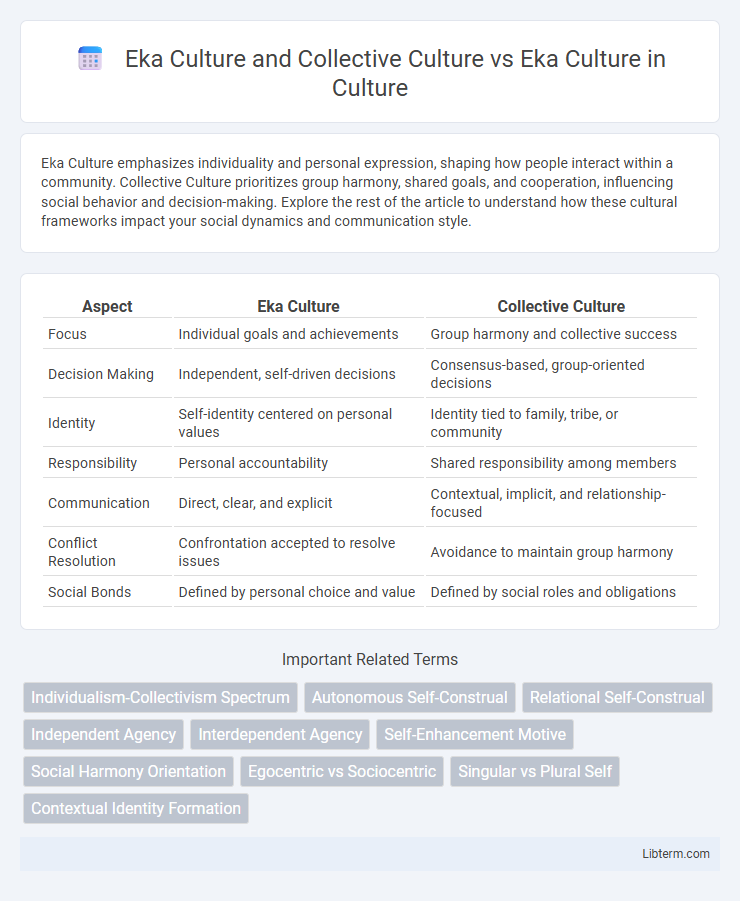Eka Culture emphasizes individuality and personal expression, shaping how people interact within a community. Collective Culture prioritizes group harmony, shared goals, and cooperation, influencing social behavior and decision-making. Explore the rest of the article to understand how these cultural frameworks impact your social dynamics and communication style.
Table of Comparison
| Aspect | Eka Culture | Collective Culture |
|---|---|---|
| Focus | Individual goals and achievements | Group harmony and collective success |
| Decision Making | Independent, self-driven decisions | Consensus-based, group-oriented decisions |
| Identity | Self-identity centered on personal values | Identity tied to family, tribe, or community |
| Responsibility | Personal accountability | Shared responsibility among members |
| Communication | Direct, clear, and explicit | Contextual, implicit, and relationship-focused |
| Conflict Resolution | Confrontation accepted to resolve issues | Avoidance to maintain group harmony |
| Social Bonds | Defined by personal choice and value | Defined by social roles and obligations |
Understanding Eka Culture: Definition and Origins
Eka Culture refers to a social system where individualism and personal achievements are emphasized, contrasting with Collective Culture, which prioritizes group harmony and shared responsibilities. Understanding Eka Culture involves exploring its roots in societies that value autonomy, self-reliance, and personal freedom, often linked to Western cultural traditions. The origins of Eka Culture highlight the importance of personal identity and independence as central cultural principles shaping behavior and social norms.
Core Principles of Eka Culture
Eka Culture emphasizes unity and holistic integration by fostering seamless collaboration among individuals to achieve shared goals, prioritizing interconnectedness over individuality. Its core principles include mutual respect, collective responsibility, and harmonious coexistence, which contrast with Collective Culture's broader societal focus. Eka Culture uniquely balances personal identity and group cohesion, promoting synergy through active participation and inclusive decision-making.
What is Collective Culture? Key Features
Collective culture emphasizes group goals, community interdependence, and social harmony, contrasting with eka culture's focus on individual achievement and autonomy. Key features of collective culture include strong family ties, prioritization of collective well-being over personal success, and an emphasis on cooperation and consensus decision-making. This cultural framework fosters social cohesion, shared responsibility, and mutual support within the group.
Comparing Eka Culture and Collective Culture
Eka Culture emphasizes individual autonomy and personal achievement, prioritizing self-expression and independence, whereas Collective Culture centers on group harmony, social cohesion, and shared responsibilities. In Eka Culture, decision-making is often self-directed and values personal goals, while Collective Culture promotes consensus and prioritizes the needs of the community over individual desires. The contrast between these cultural frameworks reflects differing social norms regarding identity, social relationships, and the balance between individualism and collectivism.
Individual Identity in Eka Culture
Eka Culture emphasizes the development of individual identity through personal achievements, self-expression, and autonomy, fostering a sense of uniqueness and personal responsibility. Collective Culture prioritizes group harmony, social cohesion, and shared goals, often placing individual desires secondary to the community's well-being. In Eka Culture, the balance shifts strongly toward individual identity as the foundation for social interaction and cultural participation, highlighting personal values over collective norms.
Social Dynamics in Collective Culture
Eka Culture emphasizes individual autonomy and personal achievement, whereas Collective Culture prioritizes group cohesion and interdependence, shaping social dynamics through shared responsibilities and communal values. In Collective Culture, social interactions are guided by mutual trust, cooperation, and adherence to social norms that reinforce group identity and harmony. This contrast highlights how social dynamics in Collective Culture foster collaboration and support systems, differing significantly from the more individualistic and self-oriented social behaviors in Eka Culture.
Decision-Making: Eka vs Collective Culture
Eka culture emphasizes individual decision-making where authority and responsibility rest primarily with a single leader, enabling swift and unilateral choices. In contrast, collective culture prioritizes group consensus and collaborative input, often resulting in more inclusive but slower decision-making processes. Understanding these differences aids in tailoring communication and management strategies to fit specific organizational or societal contexts.
Communication Styles in Both Cultures
Eka Culture emphasizes individual expression and direct communication, where personal opinions and autonomy are valued in interactions. Collective Culture prioritizes group harmony and indirect communication, with a focus on consensus-building and preserving relationships during exchanges. Understanding these communication styles is crucial for effective interaction, as Eka Culture fosters openness and explicit messages, while Collective Culture relies on context and subtlety.
Impact on Workplace and Society
Eka Culture emphasizes individual autonomy and personal achievement, fostering innovation and self-motivation within the workplace, which can drive competitive advantage but may challenge team cohesion. Collective Culture, prioritizing group harmony and collective decision-making, enhances collaboration and social support, contributing to workplace stability and community well-being. The contrast between Eka Culture and Collective Culture significantly influences leadership styles, employee engagement, and societal values related to responsibility and interdependence.
The Future of Eka and Collective Cultural Models
The future of Eka Culture emphasizes individual autonomy and personalized experiences, leveraging digital technology and global connectivity to foster unique identity expression. In contrast, Collective Culture models prioritize communal values, social cohesion, and shared goals, integrating evolving social norms and collaborative innovation to address complex societal challenges. Both models are expected to converge through hybrid frameworks that balance personal freedom with collective responsibility, shaping adaptive cultural evolution in increasingly interconnected environments.
Eka Culture and Collective Culture Infographic

 libterm.com
libterm.com